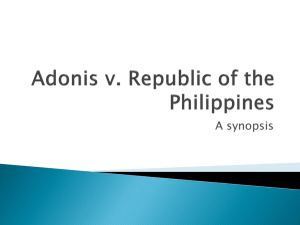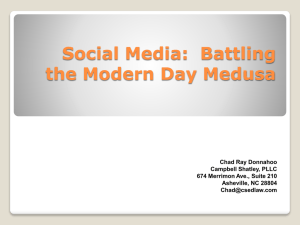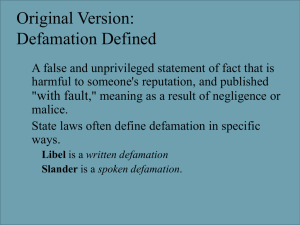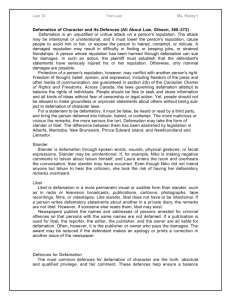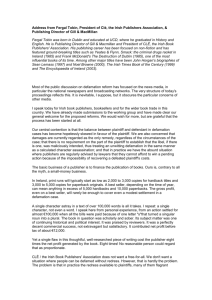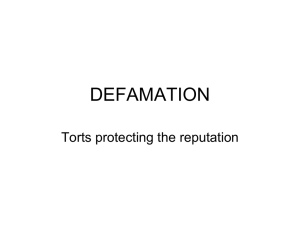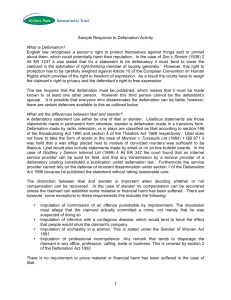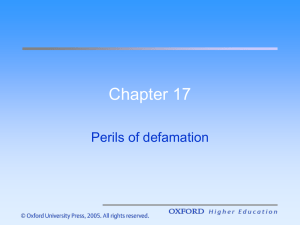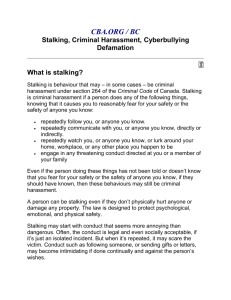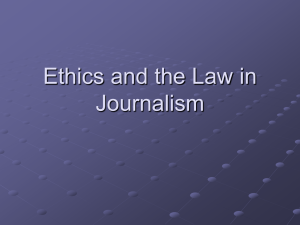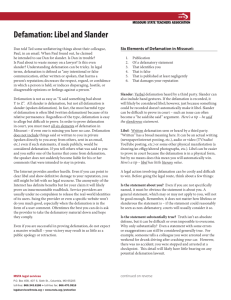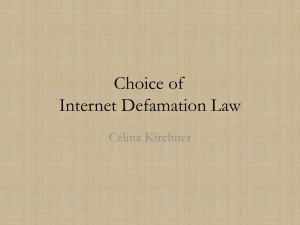Defamation 2.0 - Canadian IT Law Association
advertisement
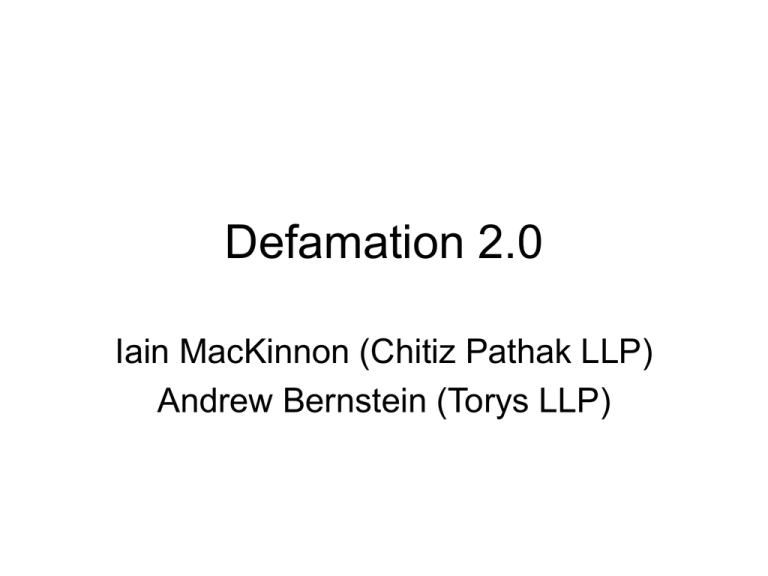
Defamation 2.0 Iain MacKinnon (Chitiz Pathak LLP) Andrew Bernstein (Torys LLP) A confession! • We are (at least sometimes) media defence counsel! • sometimes you start identifying with your client • hard to separate your “views” from the position you’ve been arguing… • don’t look to us for an unbiased account of cases we’ve been working on! 2 What is defamation anyway? • a statement about a person (real or artificial) that has the tendency to lower his, her or its reputation in the community • statement does not have to be false to be defamatory, although truth is a defence to the cause of action (assuming you can prove it) 3 Why is common law defamation harsh? • • • • Falsity is presumed Damages are presumed Malice is presumed (sort of) You can’t get out of it by saying "The Star is reporting…," even if it is! • It is a strict liability tort (could be a complete accident, with plenty of due diligence, but there is still liability) 4 Harsh… • Defamation law is broad, technical and, in the main, pretty extreme in its protection of rights • What’s legal and illegal does not always fit with people’s “sense of justice”, which is dangerous (ask the music industry…) 5 Protection for Media • Libel and Slander Act (Ontario) requires a notice of libel within a very short time after publication, and a short limitation period if defamatory statements occur in a newspaper or broadcast, with an opportunity to apologize • It is expressly intended to ensure that organizations that make a business out of creating expression have early notice of a lawsuit, and an opportunity to mitigate damages 6 The clash • • • • Free expression guaranteed by s. 2(b) important Charter value closely protected by the courts since Charter was enacted incredibly important on the Internet Reputation • considered a constitutional value • closely protected by the common law for hundreds of years • incredibly vulnerable on the Internet 7 Pre-internet era, Supreme Court was unsympathetic to free expression concerns caused by defamation Hill v. Scientology: • Certainly, defamatory statements are very tenuously related to the core values which underlie s. 2(b). • The right of public discussion is, of course, subject to legal restrictions … conceived for the protection of various private and public interests with which, for example, the laws of defamation and sedition are 8 concerned. Hill v. Scientology (cont’d) • The right of a man to the protection of his own reputation from unjustified invasion and wrongful hurt reflects no more than our basic concept of the essential dignity and worth of every human being -- a concept at the root of any decent system of ordered liberty. 9 Hill v. Scientology (cont’d) • I simply cannot see that the law of defamation is unduly restrictive or inhibiting. • Surely it is not requiring too much of individuals that they ascertain the truth of the allegations they publish. • Those who publish statements should assume a reasonable level of responsibility. 10 So you can guess what they did… • Refused to impose any real restrictions on defamation law in the name of the Charter • Maintain the presumption of falsity and damages • Impose no due diligence defence or need to prove negligence 11 Defamation and technology • Defamation used to be “hard to do” • Defamation is now “easy to do” because of technology • Mostly not a huge issue because most people don’t enforce all their rights • However, no doubt that it does cause problems from time to time 12 Ask yourself this question… • What’s a more progressive force… Law Technology? 13 So the question is… • Defamation law survived the Charter without a scratch … will it survive the Internet? 14 Technology changes…! Liz: "Okay, very funny. You bought a pager from Dennis. Will you take it off now, please? " Jack: "Oh, I can't. I'm expecting a call from 1983." 15 Defamation law stays the same • The last 15 years have seen the development of some of the best technology for widespread defamation since … 16 Of course, defamation was possible before the internet too 17 Five important areas where defamation meets the internet • • • • • Liability for hyperlinking Jurisdiction and libel tourism Internet anonymity Fair Comment Defence of responsible communication 18 Publication 19 Crookes v. Newton • Blogger writing about free speech issues. Wrote an article about libel chill by a litigious member of the BC Green Party, Wayne Crookes, suing “openpolitics.com” for an article called “Gang of Crookes” • Hyperlinked the name Wayne Crookes • Link was to the openpolitics.ca site • Crookes complained and Newton did not remove the hyperlink 20 The Publication Requirement • The actus reus in defamation law is publication the essence of that is the communication of the statement to the public • Question in Crookes v. Newton is whether providing a hyperlink constitutes publication (footnotes do not) • BCCA: hyperlinking alone is not publication but it might be with approbation or adoption • SCC: Most of the parties (except Crookes) agreed that approbation or adoption could be 21 enough CCLA submissions • Internet enhances freedom of expression (before, this right was somewhat restricted to people with a lot of money and/or time!) • Internet permits true marketplace of ideas (don’t need to sue for libel - can use the internet to set the record straight) • Hyperlinks are key to the internet’s success as a medium • Do we really want people responsible for all the content they link to? • Where do you draw the line? • Hyperlinking should not be publication! 22 Libel Tourism 23 Libel Tourism Black v. Breedon • Need a real and substantial connection to sue in any province • In Ontario, that is presumed if you meet one of the requirements of rule 17 • H. International, in Chicago, sends out a press release (including to Canadian media) and posts statements things about B., who has a real connection to Ontario but is neither an Ontario resident nor a Canadian citizen 24 Libel Tourism • Question is: is this enough to ground a real and substantial connection? • Motion judge concludes that the tort was committed in Ontario (so satisfies rule 17), on the theory that the tort occurred in Ontario, by virtue of the fact that the defamatory material was accessible in Ontario (on the internet). 25 Libel Tourism • Defendants argued in the CA that there should be a targetting analysis: did the defendants target people in the jurisdiction (Ontario). • CA says that they don’t have to decide whether or not that is necessary as a matter of law, because, as a matter of fact, targetting happened (releases were directed to Ontario media) 26 Internet Anonymity 27 Internet anonymity • Don’t always know who is speaking on the internet … but you can (almost) always find out • Question is: when do you want to bring the full force of the law down on an anonymous speaker who is engaging in free expression? • Most of the time, people are just looking to find out who it is - should the court let them? 28 Anonymity • Rules of Civil Procedure are tilted in favour of full disclosure: – r. 30: produce an affidavit of documents that contains every relevant document • What if defendant A (website) has identity of defendants B and C? Does it have to be produced on the affidavit of documents? 29 Warman v. Fournier • Question is: what do you need to show before you can get this discovery? – bona fides (i.e., good faith - a subjective test)? – prima facie (i.e., a reasonable case on the merits - an objective test of the strength of the case?) • Divisional Court said that in deciding this, the court must take into account privacy concerns and free expression • remitted back to a different motion judge 30 Warman v. Fournier • Court recognized potential chilling effect • Court noted that there is no compelling interest in allowing someone to libel and destroy the reputation of another while hiding behind a cloak of anonymity • Balancing of interests 31 Fair Comment 32 WIC Radio v. Simpson • Compare an anti-gay crusader (Simpson) to Governor Wallace and Hitler • Issue is: is that a statement of opinion? • Radio personality admitted that he did mean to say that Simpson was a bigot but did not mean to say that she would condone violence • Question is whether it is necessary to prove that the opinion is honestly held by 33 the speaker WIC Radio • An individual’s reputation is not to be treated as regrettable but unavoidable road kill on the highway of public controversy, but nor should an overly solicitious regard for personal reputation be permitted to chill freewheling debate on matters of public interest • Much more balanced than Hill v. Scientology! 34 WIC Radio • Court found that an opinion can be fair even if the speaker does not believe it - it refers to limits to what any honest person, however opinionated or prejudiced, would express upon the basis of the relevant facts. 35 Responsible Communication 36 Responsible Communication Grant v. Torstar • Biggest change in the law in some time • Permits a defence to defamation if the communication is (objectively) reasonable and in the public interest • Unlike UK case, not restricted to journalism: any communication can be responsible • Bloggers expressly referred to 37
